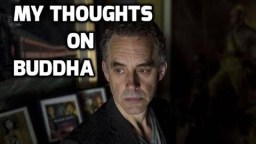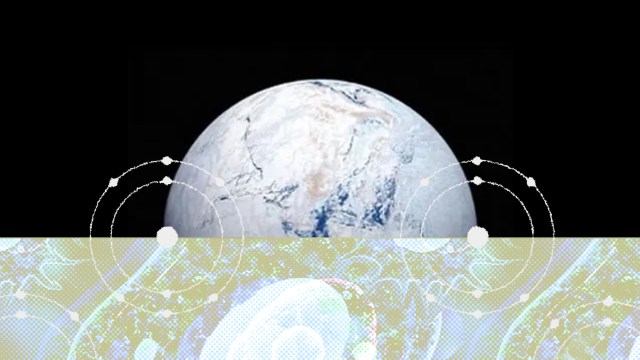Life is hard: Jordan Peterson and the nature of suffering

Jordan Peterson addresses students at The Cambridge Union on November 02, 2018 in Cambridge, Cambridgeshire. (Photo by Chris Williamson/Getty Images)
- The simplicity of Peterson’s message on suffering echoes Buddha and Rabbi Hillel.
- By bearing your suffering, you learn how to become a better person.
- Our suffering is often the result of our own actions, so learn to pinpoint the reasons behind it.
The main reason I came to appreciate Buddhism is its elegant simplicity. Sure, thousands of mythologies grew from the tradition: hungry ghosts, rebirth, dharmapala, heaven and hells. Buddhist metaphysics will make your head spin. At heart, the sage from modern-day Nepal taught a universal message applicable to everyone, everywhere: we find life unsatisfactory and so we suffer.
Here we are, two-and-a-half millennia later, still reeling in pain. An unprecedented opioid epidemic signaling our intolerance for pain — physical and emotional pain are related; religious and populist fervor infecting social discourse; increased rates of anxiety, depression, and suicide, especially among the young; tragic upticks in obesity, metabolic diseases, and cancer; Twitter.
We live in a time of plenty, a time of excess, but human nature intervened so that the few stole the plenty and left the many to war over the scraps. Self-obsession, the fuel behind the insecurities causing us to lash out any time our race/gender/sexual orientation is remotely challenged, infects our echo chambers. Pity the fool who dare enter with a divergent idea.
Buddha knew the inability to see beyond suffering was the result of mindset. His program, The Noble Path, was a means for escaping this fate and changing your mind. It took — it takes — a lot of work because we’re conditioned to act reflexively, to fear the other, to defend our territory at any cost necessary, even if that territory is a screen that can’t shout back. We forgot (or don’t care) that those daggers pierce the other side when thrown.
Another religion, Judaism, is similar to Buddhism, in a metaphysical sense, and can be brilliantly summed up in a singular thought, presented by the first century BCE teacher, Hillel. When asked to teach the entirety of the Torah on one leg, he replied, “That which is hateful unto you do not do to your neighbor. This is the whole of the Torah. The rest is commentary. Go forth and study.”
Jordan Peterson – Life is suffering, so get your act together!
Such can also be said of Buddhism: we suffer when misperceiving the nature of reality. There is a way out of suffering in many ways similar to Hillel’s philosophy, except with more meditation — keeping in mind that meditation predominantly meant “contemplation.” Closing your eyes to focus is a skill we can all use more of in the Age of Screens.
The screen is also a metaphor long employed by Buddhists, as in: we see the world as if through a screen. Remove it and reality becomes clear.
We’re all products of our environment. Mine was slightly militaristic. My father is a veteran. His four years in the Navy heavily influenced his relationship to time (he’s always early, a quality passed along to me, much to the chagrin of my wife) and his by-the-bootstraps mentality. As part of the Silent Generation he put his head down and worked, first serving the country, then in computer operations for nearly a half-century at Dupont.
Life was never about being happy; it was survival. You did what you could do to get by. When moments of happiness arrive, embrace them, but don’t hold on too tightly — they are fleeting. Very Buddhist upbringing in that sense, even if my father’s agnosticism turned into my atheism. We agree on the basics.
Which is what interested me about Jordan Peterson’s work. I’ve written a number of pieces about the Canadian professor on this site, some championing parts of his messages, others contesting them — I discuss that balance here — but what drew me in, as it has so many others, is his willingness to admit that life is quite the challenge. If you’re not ready to face that, you’re going to suffer. Or, as he phrases it,
Pick up your damn suffering, and bear it, and try to be a good person so you don’t make it worse.
Dr. Jordan Peterson | 10 Things That Will Change Your Life Immediately
Life is, as he also puts it, unfair. The 26 richest people in the world control as much wealth as the bottom 3.75 billion people. That’s not the result of successful business practices. It’s stealing. Such an occurrence could never happen in small, tribal societies. But certain people figured out how to exploit globalism and took everyone for a ride. More importantly, there’s nothing metaphysical or divinely sanctioned about it. It is what it is. Look at it, turn it over, turn it around, but look at it. Then figure out how to address the issue because — as Buddha and Hillel and Peterson would say— the issue is in your head.
How you act when facing this fact is your challenge. There are reasons each of us suffer; what unites us is that we suffer. Or we’ve moved past it, which is the point where you help others through empathy and understanding. Getting bogged down in the pain, yours or others, isn’t helping anyone. Or, as Peterson expresses in 12 Rules For Life:
“Before you help someone, you should find out why that person is in trouble. You shouldn’t merely assume that he or she is a noble victim of unjust circumstances and exploitation. It’s the most unlikely explanation, not the most probable. In my experience — clinical and otherwise — it’s just never been that simple. Besides, if you buy the story that everything terrible just happened on its own, with no personal responsibility on the part of the victim, you deny that person all agency in the past (and, by implication, in the present and future, as well). In this manner, you strip him or her of all power.”
Bootstraps, even if that analogy always was a bit weird.
Because in a time of excess, where so many own more than ever before even with such income disparity, the complaints people have are hard to handle. Reality television and social media unleashed in public the awful fact that too many of us take ourselves way too seriously, unable to see beyond the tiny bubble allowed onto their screen.
In the face of actual suffering — as in, global displacement due to climate change, the major consequence of our excess — we’ll see how we really fare. At this point it’s not looking good. That said, as wistful and petty as humans can be, we’re also resilient and courageous when called upon. When you don’t have time to contemplate suffering, when you’re thrown in the midst of challenge with no escape, you come face to face with who you really are.
As those uncanny Zen Buddhists like to riff on their teacher’s legacy, whose face will appear then?
—
Stay in touch with Derek on Twitter and Facebook.





